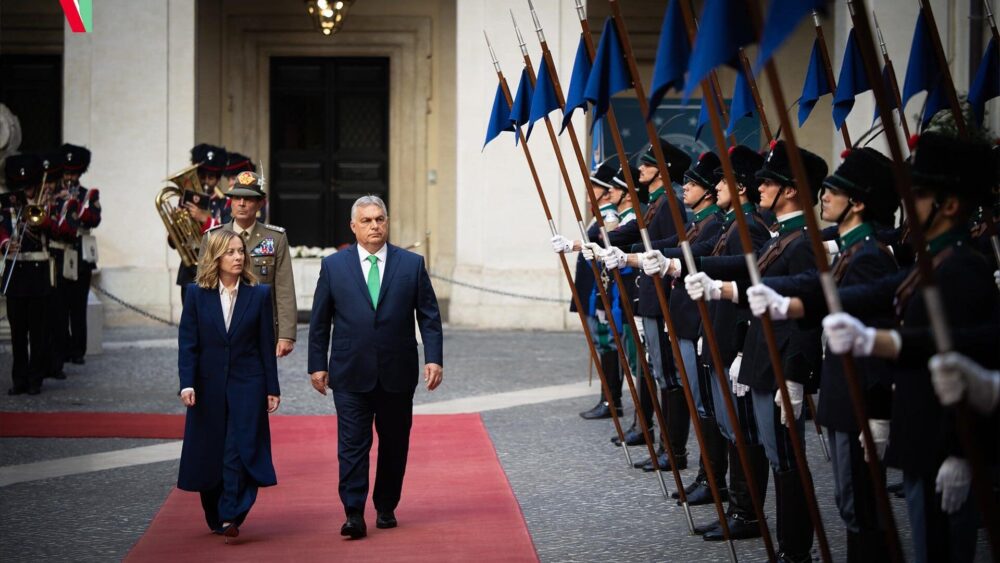
Italian PM Giorgia Meloni and her Hungarian counterpart Viktor Orbán
Orbán Viktor/Facebook
Italian Prime Minister Giorgia Meloni expressed her support for Hungary’s upcoming EU Presidency at a meeting with the country’s Prime Minister Viktor Orbán in Rome on Monday evening, June 24th. The two conservative allies highlighted migration and the continent’s demographic decline as two areas of concern that need to be addressed. They also agreed that the results of the European elections and the European Parliament’s rightward shift should be considered when dividing up the EU’s top jobs.
Rome was the second stop of Viktor Orbán’s tour of Europe during which he is briefing fellow European leaders about the programme of the Hungarian EU Presidency which begins on July 1st. The prime minister met German Chancellor Olaf Scholz last Friday and will travel to Paris for negotiations with French President Emmanuel Macron next week.
We are just a week away from the Hungarian Presidency of the EU. #Italy is one of our most important allies in achieving our goals in the field of #migration and #competitiveness. Thank you for your hospitality, Prime Minister @GiorgiaMeloni! 🇭🇺🇮🇹 pic.twitter.com/POezNVVxvW
— Orbán Viktor (@PM_ViktorOrban) June 24, 2024
The agenda of the presidency was unveiled last week, with Hungary vowing to “provide real solutions to the real problems of Europe.” The priorities include illegal migration, declining birth rates, competitiveness, and creating a farmer-oriented climate and agricultural policy—issues that Europe has failed to address in recent years.
Meloni stressed that stopping illegal mass migration and human smuggling, protecting the EU’s external borders, and cooperation with countries of origin and transit are priorities for both Hungary and Italy. Orbán said he supports Italian plans to help with the development of African nations because, he emphasised, within twenty years Africa’s population will grow by twice the size of the EU’s current population.
The Hungarian presidency does not seek to act quickly on EU accession talks with Ukraine, as Hungary has been the only EU member state clearly opposed to the war-torn country’s potential membership. Hungary has also opposed sending weapons to Ukraine, whereas Italy has been a staunch supporter of the country. Meloni touched on the issue, saying “we know very well that our positions do not always coincide.” She added, however: “I very much appreciate the position that Hungary has shown so far, both within the European Union and within NATO, allowing other member states, allowing allies to make very important decisions even when he didn’t completely agree.”
Her words were a reference to an EU decision last December to start accession talks with Ukraine, and a planned NATO mission to Ukraine—moves that Hungary did not endorse, but neither did it block them.
Orbán and Meloni do agree, however, that the results of the recent European elections should be taken into account during EU leaders’ negotiations to find suitable candidates as heads of the main EU institutions—the Council, the Commission and the European Parliament. As we reported, the opinion of conservative leaders was ignored at an EU summit last week, with the centrists and socialists seeking to divide the top jobs among themselves, despite the big gains made by conservative and right-wing parties at the elections. Giorgia Meloni, who is also the President of the European Conservatives and Reformists Party (ECR), which now has the third largest group in the Parliament, was apparently sidelined during talks.
Viktor Orbán warned against the existing centrist-socialist alliance that dominates the Parliament dividing up the best positions between them. “Everyone must be included, no country in the EU should be allowed to feel that it is in the minority or in opposition, this is a philosophically and strategically wrong path that the EU should not follow,” he said. The issue will be further discussed at this week’s EU summit in Brussels.
Dichiarazioni congiunte con il Primo Ministro dell'Ungheria @PM_ViktorOrban. Seguiteci in diretta. https://t.co/Hi43NgKvDs
— Giorgia Meloni (@GiorgiaMeloni) June 24, 2024
The Hungarian Prime Minister confirmed on Monday that his party, Fidesz will not be joining the ECR despite their close relationship with Giorgia Meloni and her party, Fratelli d’Italia. “We cannot be in a party alliance with an anti-Hungarian Romanian party,” he said, referring to the Alliance for the Unity of Romanians (AUR) party which recently joined the ECR. As we reported, the main reason several ECR members have been reluctant to welcome Fidesz is because it is deemed not pro-Ukraine enough. The admittance of AUR therefore, which has been known for its anti-Ukrainian, anti-Hungarian and antisemitic rhetoric, raises questions about the ECR’s “values.” According to co-president Nicola Procaccini, boosting the numbers was the main motivation behind admitting AUR’s five MEPs and not necessarily a pre-existing ideological alignment.
“We pursue national politics, we protect our own interests, therefore we cannot be members of a political formation which hosts an anti-Hungarian Romanian party,” Viktor Orbán said, adding that “despite this, we are all committed to advancing cooperation between European right-wing parties. Even if we will not sit in the same group in the coming period.”
As Italian news agency ANSA summarises, Giorgia Meloni is, on the one hand, keen to maintain her good relations with European Commission President Ursula von der Leyen and cooperate with the largest European party, the centrist European People’s Party (EPP) in order to gain influential positions for Italy. On the other hand, she wants to have a strong network of European right-wing parties, to be able to intensify external pressure on the mainstream parties on issues important for Italy.
